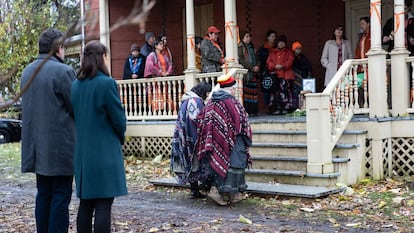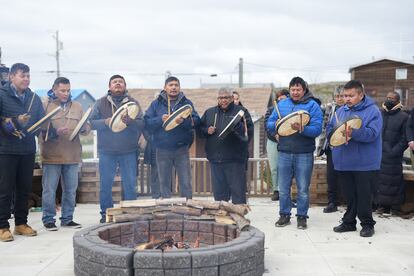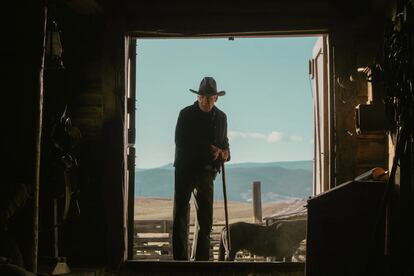From ‘Yellowstone’ to ‘Reservation Dogs’: How the West was won back by Native Americans in US television shows
‘1923’, ‘Alaska Daily’, ‘Three Pines’ and ‘The English’ are among many recent series to have addressed the past and present suffering of American Indians


In 1786, 10 years after the United States Declaration of Independence, when the Constitution had still yet to be enshrined, the first Indian reservation was created. It was the beginning of what would turn into a long series of wars, massacres, betrayals and lies, which became considerably more pronounced as the early pioneers spread westward. Native Americans being penned in on almost always arid, unproductive terrain and far from their ancestral lands, was one of the many faces of the gradual annihilation of America’s Indian tribes.
Today’s reservations are desolate places, where poverty and a form of 21st-century Prohibition reign in the face of problems with alcoholism, and casinos and prefabricated houses sit on dusty or icy roads. Nevertheless, an ancestral dignity has managed to survive. A 2022 investigation by The New York Times revealed that Native Americans suffered far more than any other US community during the Covid-19 pandemic and that their life expectancy, already the lowest in the country, had dropped from 71.8 years to 65.2, a statistic that underlines the ongoing marginalization of American tribes.
Recently, several television shows have been produced that reflect the harsh and complex reality of the reservations, in the present and during a past marked by racism and physical and cultural extermination. Yellowstone, and above all its prequel, 1923 (SkyShowtime); Reservation Dogs (Disney+); Alaska Daily (Disney+), and Three Pines (based on the novels of Louise Penny, which will premiere on AXN on April 25) all shone a light on the social problems faced by Native Americans, but also their historical suffering. The English, recently broadcast on HBO Max, highlighted the racism and violence that accompanied the settlement of the West.
“Up until now, most series have offered a very problematic portrayal of Native Americans. In many cases, their problems represented little more than a footnote,” explains Liza Black, a citizen of the Cherokee Nation and associate professor of history and Native American studies at Indiana University. “The American television series we have seen in recent years are infinitely more aware of Native American social issues than in the past.”

Black, who is an expert on how cinema has historically portrayed Native Americans, explains that the turning point in televisual treatment of American Indians was forged by the Black Lives Matter movement against institutional racism and police violence in the U.S., which took on an international dimension in 2020 following the police killing of George Floyd in Minneapolis. “These series are a result of the global uprising against police violence and its denunciation that racism pervades all aspects of American life,” she says. “That movement was fueled by significant support from Native Americans, who promoted the removal of monuments to European settlers and demanded the return of land. Many screenwriters had been trying for years to secure funding for their projects: 2020 led those with money and power to seek out projects that sent the right message about indigenous peoples.”
Yellowstone, starring Kevin Costner, and 1923, starring Helen Mirren and Harrison Ford, reflect this new appraisal of one of the tragedies — together with slavery — that mark the creation and expansion of the United States. This critical view of U.S. history has been met with strong rejection from the most conservative sectors of society, such as the Republican governor of Florida, Ron DeSantis, a probable candidate for the 2024 presidential elections who in February announced his intention to ban state schools from teaching programs related to diversity, equity and inclusion, and critical race theory.

The two series — as well as 1883, a miniseries prequel to both 1923 and Yellowstone — were created by Taylor Sheridan, who had already portrayed violence against Native American women in the 2017 movie Wind River (Amazon Prime). They tell the story of the Dutton family, from their arrival in Montana from Scotland and Ireland, to their settlement at the foot of the Rocky Mountains next to the most important national park in the U.S., and their transformation into an empire of power, violence, and corruption, with echoes of The Godfather. An important part of the plot of Yellowstone takes place on an Indian reservation, but a subplot from 1923 confronts the enormous suffering endured by many Native American children, who were forcibly placed in Catholic religious schools after being separated from their families. There, they were forced to change their names, forbidden to speak their language and, in many cases, were tortured, raped, and killed. Women particularly suffered from this violence. “I don’t think that there is a more misrepresented group in American cinema than the Native American. And what little I can do to correct that historical perspective in fiction, I’m going to do,” Sheridan said in the making-of documentary 1883: The Road West.
Reviewer Christian Blauvelt wrote in the magazine Indiewire last February: “Though Sheridan has sensitively engaged with Native American issues before (especially in his directorial debut Wind River), this is something new: It draws an inherent line from the horrors of colonization in the past to the continued injustices Native Americans face today, how a legacy of genocide continues to structure their contemporary struggles.”
It is a subject also addressed in the novels of Canadian author Louise Penny, through her protagonist Chief Inspector Armand Gamache, which form the basis of Three Pines. The series is set in Quebec, where the discovery of hundreds of graves in former religious boarding schools caused a national uproar and led Pope Francis to “humbly beg forgiveness for the evil committed by so many Christians against the Indigenous peoples” on a papal visit to Canada in 2022.

“Three Pines also does an excellent job of showing the horror of the schools that separated Native children from their parents,” says Black. “It treats the subject with great emotion and sincerity. Both Alaska Daily and Three Pines do an excellent job of getting into the details of those horrors, showing how investigations can be a powerful tool in bringing past and present crimes to light.”
Alaska Daily, starring Hilary Swank and created by Tom McCarthy, who won an Oscar for his 2015 movie Spotlight, which chronicled the Boston Globe’s investigation of sexual abuse within the Catholic Church, was inspired by a long-running Anchorage Daily News and ProPublica investigation into the disappearance and murder of thousands of Native women in Alaska. Data from these two media outlets revealed that 5,700 Native women had gone missing in the state, but only 116 cases had been investigated. Reservation Dogs, created by Taika Waititi and Sterlin Harjo, offers a less violent view of life on an Indian reservation, although behind its rather black comedy lies the story of the marginalization of its characters, whose only chance of a future consists of escaping the place where they live.
“I’ve killed more Indians in my movies than the entire Seventh Cavalry in a century and a half,” John Ford said before directing Cheyenne Autumn (1964), in which to a large extent he apologized to Native Americans for the image he had previously constructed of them. Hollywood was a major contributor in building the legend of the “conquest of the West,” in which the Indians were always portrayed as the bad guys and whites embodied civilization — in 1923, the ranches run out of cowboys because of an exodus to California to work as extras in westerns.
In his 2016 book The Earth is Weeping: The Epic Story of the Indian Wars for the American West, historian Peter Cozzens explains that it was not until the 1970s that “Americans began to develop a strong awareness of the innumerable damages they had caused to the Indians.” Dee Brown’s book Bury My Heart at Wounded Knee — adapted into a series by HBO — and the film Little Big Man were instrumental in that change in thinking and “gave voice to the country’s feelings of guilt,” Cozzens writes.
“This isn’t the land of waiting for back up. This is the land of you’re on your own,” Wind River’s Indian sheriff, played by Graham Greene, tells Elizabeth Olsen’s FBI agent Jane Banner. Maybe today, Native Americans are a little less alone than they have been historically.
Sign up for our weekly newsletter to get more English-language news coverage from EL PAÍS USA Edition
Tu suscripción se está usando en otro dispositivo
¿Quieres añadir otro usuario a tu suscripción?
Si continúas leyendo en este dispositivo, no se podrá leer en el otro.
FlechaTu suscripción se está usando en otro dispositivo y solo puedes acceder a EL PAÍS desde un dispositivo a la vez.
Si quieres compartir tu cuenta, cambia tu suscripción a la modalidad Premium, así podrás añadir otro usuario. Cada uno accederá con su propia cuenta de email, lo que os permitirá personalizar vuestra experiencia en EL PAÍS.
¿Tienes una suscripción de empresa? Accede aquí para contratar más cuentas.
En el caso de no saber quién está usando tu cuenta, te recomendamos cambiar tu contraseña aquí.
Si decides continuar compartiendo tu cuenta, este mensaje se mostrará en tu dispositivo y en el de la otra persona que está usando tu cuenta de forma indefinida, afectando a tu experiencia de lectura. Puedes consultar aquí los términos y condiciones de la suscripción digital.








































